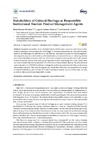Identificador persistente para citar o vincular este elemento:
https://accedacris.ulpgc.es/jspui/handle/10553/57557
| Campo DC | Valor | idioma |
|---|---|---|
| dc.contributor.author | Moreno-Mendoza, Héctor | - |
| dc.contributor.author | Santana-Talavera, Agustín | - |
| dc.contributor.author | León, Carmelo J. | - |
| dc.date.accessioned | 2019-10-31T11:28:13Z | - |
| dc.date.available | 2019-10-31T11:28:13Z | - |
| dc.date.issued | 2019 | - |
| dc.identifier.issn | 2071-1050 | - |
| dc.identifier.other | WoS | - |
| dc.identifier.uri | https://accedacris.ulpgc.es/handle/10553/57557 | - |
| dc.description.abstract | Increased competition in tourist destinations and the recent economic crisis directly affect various institutions that manage cultural heritage. In the case of museums, we may need to reflect more on the challenges that stem from the new financial and social situation for their management. The long-term analysis of relationships with stakeholders is a more reliable way of achieving stability to counteract the effects of income reduction. This study involved conducting interviews with directors of four museums, one for each existing management model, contrasting with direct observation and unstructured interviews conducted in Gran Canaria, Canary Islands (Spain). The data obtained were analyzed with UCINET (a software package for analyzing social network data), to determine relationship indicators. The research suggests that stakeholder networks, as a competitive advantage in cultural institutions, play an important role in creating or improving cultural heritage products, as well as helping to develop responsible tourism. | - |
| dc.language | eng | - |
| dc.relation.ispartof | Sustainability (Switzerland) | - |
| dc.source | Sustainability (Switzerland) [ISSN 2071-1050], v. 11 (5192) | - |
| dc.subject | 531290 Economía sectorial: turismo | - |
| dc.subject.other | Stakeholders | - |
| dc.subject.other | Heritage management | - |
| dc.subject.other | Responsible tourism | - |
| dc.subject.other | Responsible Tourism | - |
| dc.title | Stakeholders of cultural heritage as responsible institutional tourism product management agents | - |
| dc.type | info:eu-repo/semantics/article | - |
| dc.type | Article | - |
| dc.identifier.doi | 10.3390/su11195192 | - |
| dc.identifier.scopus | 85073631827 | - |
| dc.identifier.isi | 000493525500051 | - |
| dc.contributor.authorscopusid | 57209716675 | - |
| dc.contributor.authorscopusid | 57209719216 | - |
| dc.contributor.authorscopusid | 7101886256 | - |
| dc.identifier.eissn | 2071-1050 | - |
| dc.identifier.issue | 5192 | - |
| dc.relation.volume | 11 | - |
| dc.investigacion | Ciencias Sociales y Jurídicas | - |
| dc.type2 | Artículo | - |
| dc.contributor.daisngid | 31863166 | - |
| dc.contributor.daisngid | 7095343 | - |
| dc.contributor.daisngid | 597168 | - |
| dc.description.numberofpages | 14 | - |
| dc.contributor.wosstandard | WOS:Moreno-Mendoza, H | - |
| dc.contributor.wosstandard | WOS:Santana-Talavera, A | - |
| dc.contributor.wosstandard | WOS:Leon, CJ | - |
| dc.date.coverdate | Octubre 2019 | - |
| dc.identifier.ulpgc | Sí | es |
| dc.description.sjr | 0,581 | |
| dc.description.jcr | 2,576 | |
| dc.description.sjrq | Q2 | |
| dc.description.jcrq | Q2 | |
| dc.description.scie | SCIE | |
| dc.description.ssci | SSCI | |
| dc.description.erihplus | ERIH PLUS | |
| item.fulltext | Con texto completo | - |
| item.grantfulltext | open | - |
| crisitem.author.dept | GIR TIDES: Economía, medioambiente, sostenibilidad y turismo | - |
| crisitem.author.dept | IU de Turismo y Desarrollo Económico Sostenible | - |
| crisitem.author.dept | Departamento de Análisis Económico Aplicado | - |
| crisitem.author.orcid | 0000-0001-9451-4093 | - |
| crisitem.author.parentorg | IU de Turismo y Desarrollo Económico Sostenible | - |
| crisitem.author.fullName | León González, Carmelo Javier | - |
| Colección: | Artículos | |
Citas SCOPUSTM
27
actualizado el 08-jun-2025
Citas de WEB OF SCIENCETM
Citations
22
actualizado el 01-feb-2026
Visitas
101
actualizado el 01-jun-2024
Descargas
187
actualizado el 01-jun-2024
Google ScholarTM
Verifica
Altmetric
Comparte
Exporta metadatos
Los elementos en ULPGC accedaCRIS están protegidos por derechos de autor con todos los derechos reservados, a menos que se indique lo contrario.
